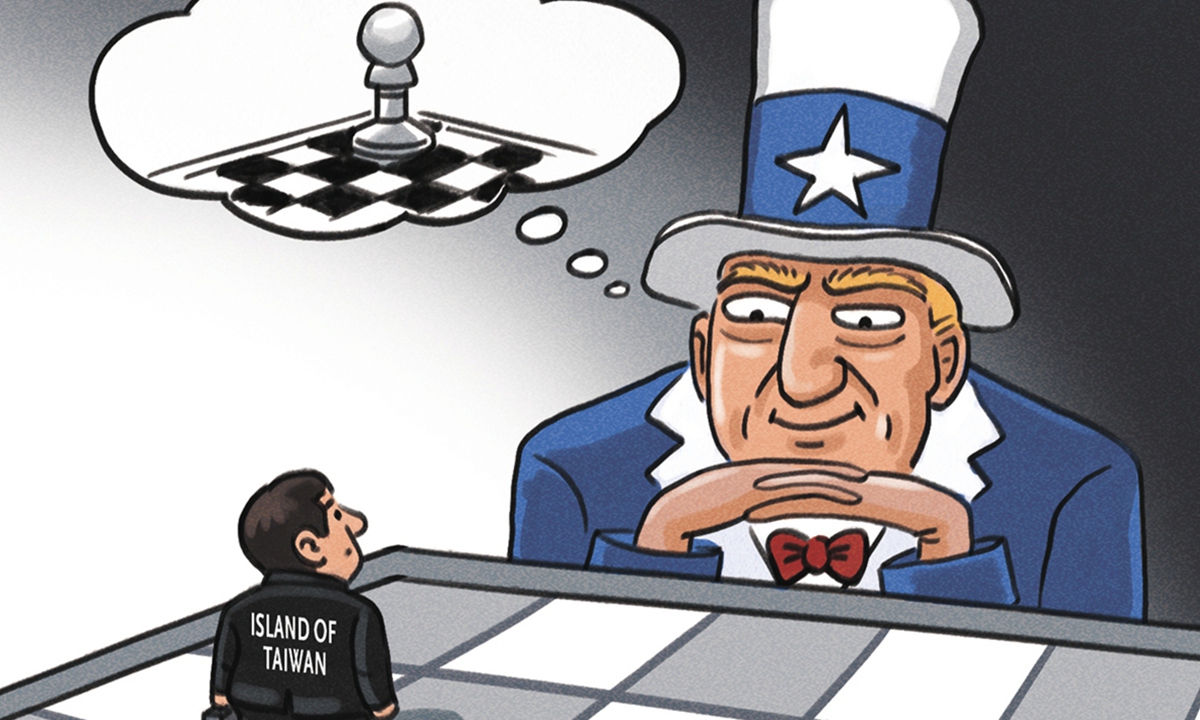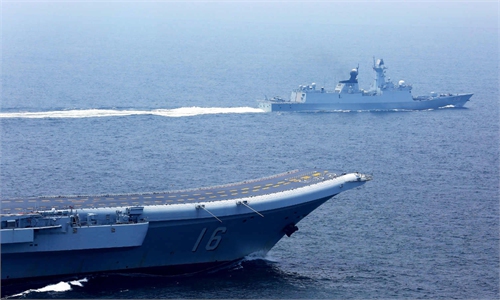Hyping mainland’s ‘strategic ambiguity’ on Taiwan question is muddying the waters: expert

Illustration: Liu Rui/GT
US and Western media outlets have repeatedly played up the tensions across the Taiwan Straits. They are attempting to speculate the intention of the Chinese mainland. The Financial Times recently published an article in this regard. The article entitled "The moment of truth over Taiwan is getting closer" said that the Chinese mainland "is deploying its own form of 'strategic ambiguity' over Taiwan — constantly reiterating its willingness to go to war, while leaving Washington and Taipei guessing over how and when that might happen."Such an argument distorts the Chinese mainland's policy toward the Taiwan question, and goes against the facts.
The Chinese mainland has a clear and consistent policy regarding Taiwan question. There is only one China. Both the Chinese mainland and Taiwan island belong to one China. Cross-Straits relations are by no means "state-to-state" ties. The Chinese mainland will never allow the Taiwan secessionist forces to split China. No one should underestimate the Chinese people's determination, and strong ability to defend national sovereignty and territorial integrity.
Even though the Chinese mainland has always cherished the peace and stability across the Taiwan Straits, it will never permit some US politicians and Taiwan secessionist forces to repeatedly provoke the Chinese mainland's bottom line. The Democratic Progressive Party (DPP) authority abandoned the 1992 Consensus, undermining the basis for cross-Straits communications. Washington is behind the scene. As the US has seen China as its top rival, the island of Taiwan has become a card to play against China.
"Strategic ambiguity" has been a long-term tactic used by Washington toward the Taiwan question. Washington intends to maintain the status quo across the Straits. By adopting the "strategic ambiguity," the US hopes neither the Chinese mainland nor Taiwan can figure out the US' real intention, in this way, Washington can maximize its interests.
Recent hype in the US and Western media that the Chinese mainland would "go to war" against Taiwan island is because the US has been attempting to further intervene in the Indo-Pacific region. Taiwan is one of Washington's leverage points in the region.
As the collusion between the US and the island of Taiwan increases, the US is seemingly moving toward strategic clarity.
In September, retired US Navy Adm. Harry Harris, who was also a former head of Indo-Pacific Command, said Washington should review its ambiguous position on defending Taiwan. Harris' remarks can at least represent some hawkish politicians in the US, showing their wish to push the current US administration to change the position. According to them, the status quo in the Taiwan Straits cannot be maintained as the Chinese mainland's strength has been increasing. They believe the Chinese mainland will realize reunification but this is not favorable to them. Therefore, they think it's time to change ambiguous position.
The strategic ambiguity will unlikely be changed during Biden's presidency. Yet, he might slightly adjust the policies, but this will be a lasting process. The US has recently played small tricks in this regard. This includes showing the intent to change the name of Taiwan's representative office in the US. It also involves calling for more international space for the island. In addition, the US has also incited some allies, like Lithuania, to sound out the bottom line of the one-China principle.
The US now is trying to ease tensions with China in some aspects. But if the US really means it, the country should release positive signs not only regarding trade but also concerning the Taiwan question. Washington should not cross the red line of one-China principle. The US should be clear that the Taiwan question is the core interest of China. It is the most important and sensitive core issue in China-US relations. It is impossible for the US to keep pushing China's bottom-line over the Taiwan question while hoping to reach a détente of relations with China.
The author is a Beijing-based expert on China-US relations. opinion@globaltimes.com.cn


